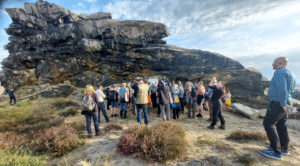Project 2439 my: Warm Intervals in the Southern Hemisphere (WiSH)
This project develops a southern hemisphere-focused community of practice on understanding the nature, properties and spatio-temporal patterns of warm intervals in the southern hemisphere during the Quaternary.
Abstract
This project is focused on understanding the nature, properties and spatio-temporal patterns of warm intervals in the southern hemisphere (WiSH) during the Quaternary. This is achieved through (1) building a community of practice of research scientists (including ECRs and students) across different institutions, countries and regions in the southern hemisphere, and (2) building on existing and developing new multidisciplinary projects that focus on specific proxies, environments or time periods of the Quaternary in which warming has taken place. Understanding the controls on and characteristics of warm phases is important in the light of present global warming; it is likely that many critical thresholds of Earth system behaviour are linked to warming rather than cooling.
Warm intervals during the Quaternary vary in length, spatial scale, and magnitude, and ranged from warm marine isotope stages through to shorter-lived phases associated with ocean-atmosphere variability. There is however a lack of data on warm episodes during the Quaternary – both globally and in particular in the southern hemisphere – where the research emphasis has been on cold phases rather than warm phases.
This project will work towards understanding warm intervals through analysis of existing and new multiproxy and modelling studies undertaken in different physical environments across the southern hemisphere, in both terrestrial and marine environments. Through this project we anticipate identifying some of these boundary conditions associated with warm phases, particularly through modelling approaches.
Objectives:
• building a community of practice of research scientists (including ECRs and students) across different institutions, countries and regions in the southern hemisphere,
• building on existing and developing new multidisciplinary projects that focus on specific proxies, environments or time periods of the Quaternary in which warming has taken place,
• achieve these goals through online and face to face workshops, seminars, training sessions and other activities.
Project leaders:
- Prof Jasper Knight (project coordinator), South Africa
- Prof Jamie Shulmeister, New Zealand
- Dr Lydia Mackenzie, Australia
- Dr Elizabeth Rudolph, South Africa
- Ms Javiera Carraha, Chile
- Prof Kathryn Fitzsimmons, Australia
Upcoming events:
- Online parallel regional symposia in Australasia, South Africa and South America, February 2025
- Sessions proposed at the IAG 11th Conference on Geomorphology (Christchurch, New Zealand, February 2026)
Explore more
Latest developments
View moreLatest developments PALCOM-supported sessions
PALCOM-supported sessionsINQUA PALCOM interactive bulletin of scientific sessions for the INQUA Congress 2027
 New QP Issue Out!
New QP Issue Out!QP Issue 39 December 2025 is now available online!
 INQUA 2025 Sir Nicholas Shackleton Medal
INQUA 2025 Sir Nicholas Shackleton MedalThe INQUA 2025 Sir Nicholas Shackleton Medal recipient is Prof. Dr. Nicole Khan from the University of Hong Kong (Hong Kong)
 7th International Palaeontological Congress – IPC7
7th International Palaeontological Congress – IPC7The 7th International Palaeontological Congress (IPC7) will be held between 30 November – 3 December 2026 in Cape Town, South Africa
 4th International Conference Polar Climate and Environmental Change in the Last Millennium
4th International Conference Polar Climate and Environmental Change in the Last MillenniumThe 4th International Conference Polar Climate and Environmental Change in the Last Millennium will be held in Toruń on August 28–30, 2026
 Online Workshop R Fundamentals for Data Science
Online Workshop R Fundamentals for Data ScienceOnline Workshop R Fundamentals for Data Science from DataSharp Academy


